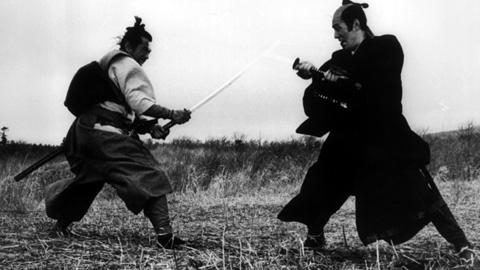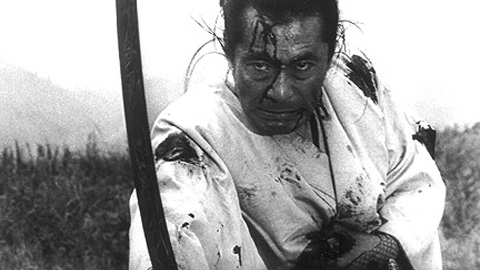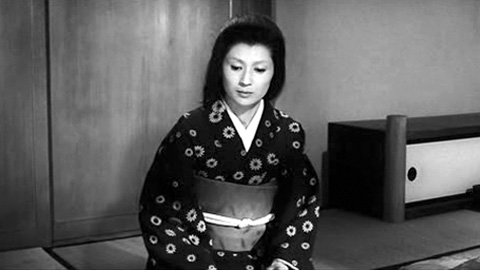Samurai Rebellion
- Year
- 1967
- Original title
- Joiuchi Hairyo Tsuma Shimatsu
- Japanese title
- 上意討ち 拝領妻始末
- Director
- Cast
- Running time
- 121 minutes
- Published
- 28 September 2011




by Nicholas Rucka
You don't realize how rare master craftsmanship in filmmaking is until you see it. But then, ironically, it's not something that is so much seen as felt.
I started thinking about this when the lights went up after a screening of Masaki Kobayashi's 1967 film Samurai Rebellion. This thought then inevitably led to the realization that it had been ages since I had seen a film so well crafted in a movie theater. It seems silly to write this, but the difference between good filmmaking and great filmmaking is that with one you're aware of the craft while you're watching it while the other hits you after it's done.
Samurai Rebellion is, if not a masterpiece, then certainly an exemplar work of directing mastery. With almost no seams that belie its structural form it is a film of such precise and exquisite design that like so many of the buildings which are lovingly shot by cinematographer Kazuo Yamada's geometrically precise Tohoscope, it's hard to point towards any one single element that makes it all work - because they all work in harmony. This means that the story, acting, drama, camera, lighting, editing, music, sound, sound design and a special invisible something that is nearly impossible to put in words (perhaps the director's filmmaking sense?) all work together equally to create a true piece of cinematic life.
Firmly rooted in the tradition of the jidai geki as social critic, Samurai Rebellion is an angry, but not pessimistic movie that focuses on the total corruption of unchecked power, its resultant hedonism, and the futility of social protest - the 'rebellion' of the title - in a society that disallows personal freedom and expression. Samurai Rebellion tells of Isaburo Sagahara (Toshiro Mifune), an aging swordsman for a corrupt clan lord, whose son, Yogoro Sagahara (Go Kato), is forced into marriage by the clan with the clan lord's disgraced mistress, Lady Ichi (Yoko Tsukasa). The request of the clan lord is not only an affront to the Sagahara family name, but it is a cynical flexing of power that is designed to make Isaburo wallow in his social status as a lowly vassal.
As luck would have it, though, Lady Ichi and Yogoro fall madly in love with each other. The clan lord's cruelty, it turns out, was a present in disguise - and not only that, Lady Ichi's aforementioned rumored disgraceful behavior was a situation of her honor and moral rectitude conflicting with those of the hedonistic clan lord. The family is brightened by their good fortune and soon Lady Ichi and Yogoro have their first child, a beautiful little girl.
But when potential political crisis threatens to upend the clan's power structure and Lady Ichi's return to the castle proves to be the only way to resolve it, the Sagaharas's fortunes turn dark. After settling in with the family, Lady Ichi swore never to return to the castle; needless to say, she refuses to leave Yogoro and her daughter. Likewise, her husband, Yogoro, can't bear to lose Ichi and is willing to destroy the Sagahara family to keep her. And for Isaburo, a swordsman who never rose above the status of unremarkable vassal, this abuse of the clan lord's power is a wake-up call... and he will fight to the death to rectify the situation.
The original title of Samurai Rebellion is Joiuchi - Hairyo Tsuma Shimatsu, literally "Rebellion - receive the wife." The use of the term 'rebellion' is very deliberate as the concept of rebellion manifests itself in many forms in the film. One of the ways shows Lady Ichi as a lowly mistress literally rebelling against the clan lord, setting the stage for her being forced into marriage with Yogoro Sagahara. Another way 'rebellion' manifests itself again features Lady Ichi, who at this point is very happily married to Yogoro and therefore refuses to be returned to the castle like a lost cow.
Not to be patronizing, but think about these two things for a moment: Lady Ichi, a woman, refuses to follow the wishes of the ruling elite. At the time that this story is set - and one can argue that it also goes for the time when this film was released - this was pretty radical stuff. But her refusals are not only directed at the clan, but are additionally, and one could argue more forcibly, directed at the Sagahara family elite. In a time and place that was so rank and order based, her behavior could be described only as radical and revolutionary.
This being said, I would argue that the major critical manifestation of 'rebellion' as a concept in Samurai Rebellion is Isaburo's total refusal to follow the clan rule of law - after years of enforcing it, I might add - because he realizes that someone, somewhere, at some time must make the clan lord responsible for his actions. And those lower class people, who have the cosmic misfortune to have been born at a lower rank in a heavily stratified caste system, shouldn't have to take responsibility for someone who has never taken any!
This then leads to what is the major critical focus of the film. Isaburo's actions are futile - but he knows it. Kobayashi chose to make a film that is not dependent on machismo sword action (and what action there is, is collected towards the end) because he is interested in telling a story seeded with some sort of optimism. The little sword fighting that is in the film is gruesome, but not so much in blood as in its heaviness, its brute force. As viewers we get the feeling as we move steadily towards the end of the film and the sides of the castle and the distance to Edo and the futility of the scale of Isaburo's rebellious challenge becomes absolutely apparent, that he will die for nothing. And in a literal since he does, but in a figurative sense he doesn't: he dies for the viewers.
In an interview by Joan Mellen which originally appeared in Voices from the Japanese Cinema [Liveright, 1975] Kobayashi talks about the killing of his protagonist at the end of his The Human Condition trilogy this way: "He had to die there. With his death, he lives in the minds of people for a long time, as a symbol of the hope..." He goes on to speak specifically about Harakiri, but it is apropos to Samurai Rebellion, I think: "I try to express the possibility that human beings can overcome the tragic events of the worlds... In this film, human evil takes the form of an oppressive feudal power structure. I was fascinated by the tenacious human resilience that continued to defy this extreme pressure."
As this shows, this turns out to be what Kobayashi is thematically fascinated with: stories about individuals that challenge authoritarianism. Samurai Rebellion, specifically, could then be viewed as a cautionary tale. No doubt the film is a response to the horrors of war and the unchecked corrupt bloat of a military government that Kobayashi saw as a soldier in Manchuria. We are meant to hurt after watching the film. It IS unjust. But you have to fight, if not for today then for the future. The best lesson we can learn is to rebel so that it can never happen again.
Ultimately, this might go a longer way towards explaining the craft of the film. I have chosen in this review not to focus on the spectacular technical aspects of the film, because Samurai Rebellion, like the incredible and thematically similar jidai-geki Harakiri, feels like a movie made with great imperative. That the craft is first rate is self-evident, but the true mastery of this film is how every element of its construction is used perfectly in telling a cautionary story of rebellion that clearly Kobayashi had to make.